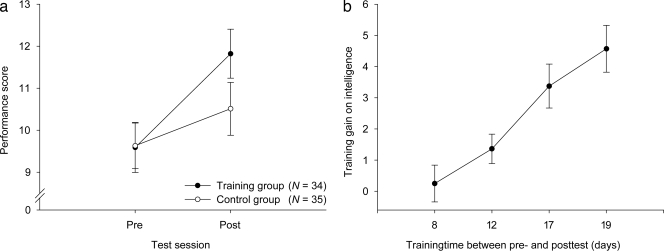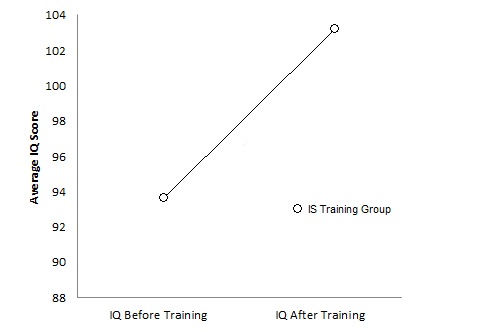How to Increase Your IQ - The Research
Research Project 1 - Improving Fluid Intelligence
Jaeggi S. M., Buschkuehl M., Jonides J., Perrig W. J. (2008). Improving fluid intelligence with training on working memory. Proceedings of the National Academy of Sciences of the United States of America. 105, 6829 – 6833
Samples from paper
There is a long history of research into cognitive training showing that, although performance on trained tasks can increase dramatically, transfer of this learning to other tasks remains poor. Here, we present evidence for transfer from training on a demanding working memory task to measures of Fluid Intelligence (Gf). This transfer results even though the trained task is entirely different from the intelligence test itself. Furthermore, we demonstrate that the extent of gain in intelligence critically depends on the amount of training: the more training, the more improvement in Gf. That is, the training effect is dosage-dependent. Thus, in contrast to many previous studies, we conclude that it is possible to improve Gf without practicing the testing tasks themselves, opening a wide range of applications.

Graphs showing intelligence transfer effects.
(a) Mean values and corresponding standard errors of the fluid intelligence test scores for the control and the trained groups, collapsed over training time.
(b) The gain scores (posttest minus pretest scores) of the intelligence improvement plotted for training group as a function of training time.
Error bars represent standard errors.
Study 2 - Comparing Methods of Skill Development
Reinert C.P, (1989).A preliminary comparison between two methods of intellectual skill development. Presented to the annual Conference of the Society for Accelerative Learning and Teaching.
Samples from paper
Analysis of results suggests that students' analytical skills rose with increasing (hours of training), with the largest rates being measured for the lowest initial analytical skills. The corresponding I.Q. gain per hour of practice ranged from a high of +2.3 I.Q. points per hour to a low of -0.9 I.Q. points per hour, with a standard deviation of 0.7. There was some indication that students with the highest I.Q. gain rates tended to be left cerebral dominant, those with intermediate gain rates were mixed dominant, and those with the lowest rates were right cerebral dominant. The average gain was 0.44. Increases in "artistic" creativity were also noted, with slightly larger increases noted for students with initially higher analytical skills. These students also reported more intuitive insights than the students with initially lower analytical skills.
- Number of students assessed: 24
- Average time training: 20.5 hours
- Average entry level I.Q.: 94
- Average exit level I.Q.: 103
- Average I.Q. gain rate: 0.44 IQ pt/hour

Graph showing average change in IQ pre and post training. The average rate of Increase in I.Q. as measured by the 38 point Whimbey Analytical Skills Inventory was found to be 0.44 IQ points per hour of practice.





